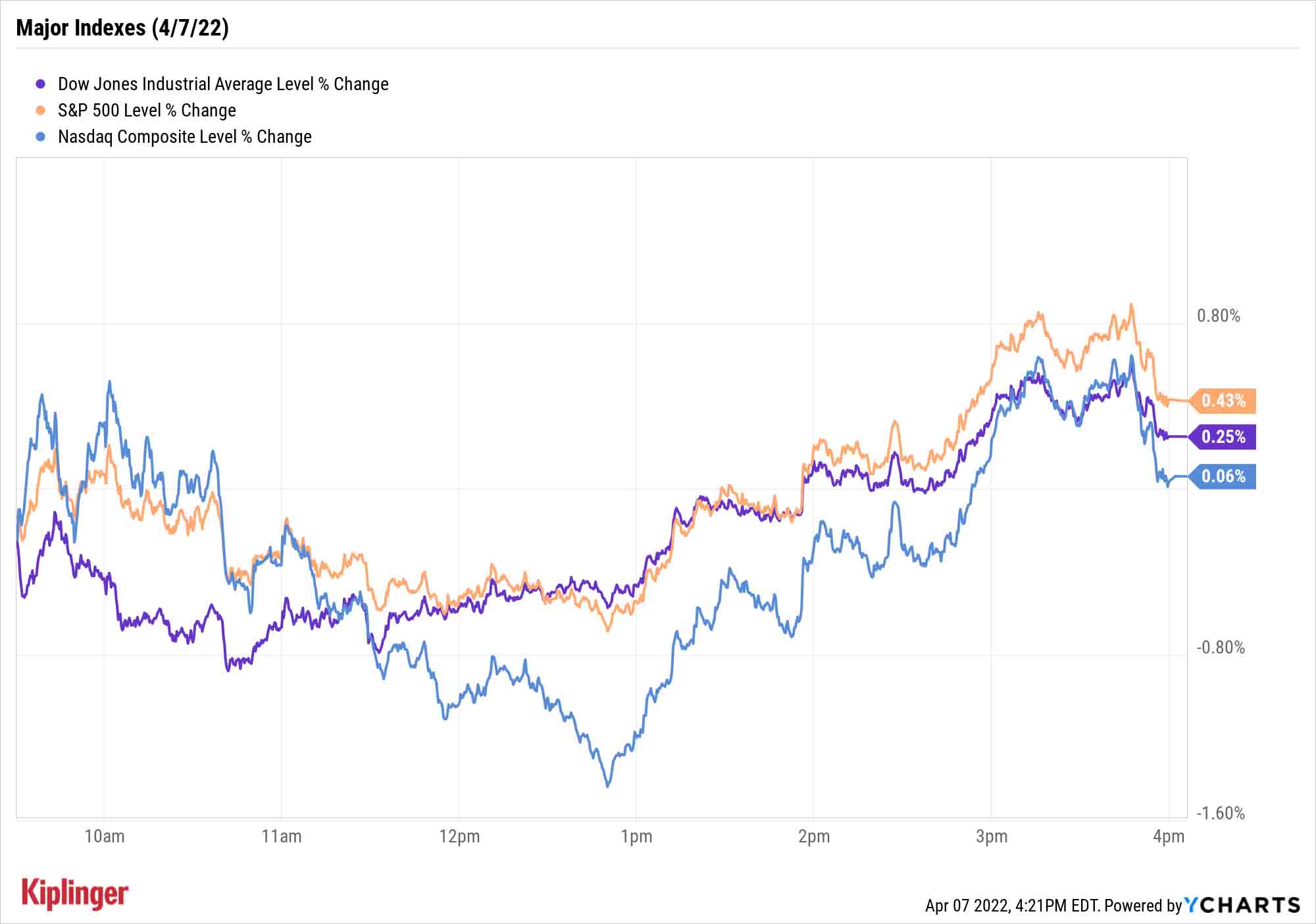Stock Market Today: Stocks Scratch Out Meager Gains
Lowest jobless claims number since 1968 gives the major indexes just enough oomph to avoid a third straight session in the red.


Profit and prosper with the best of Kiplinger's advice on investing, taxes, retirement, personal finance and much more. Delivered daily. Enter your email in the box and click Sign Me Up.
You are now subscribed
Your newsletter sign-up was successful
Want to add more newsletters?

Delivered daily
Kiplinger Today
Profit and prosper with the best of Kiplinger's advice on investing, taxes, retirement, personal finance and much more delivered daily. Smart money moves start here.

Sent five days a week
Kiplinger A Step Ahead
Get practical help to make better financial decisions in your everyday life, from spending to savings on top deals.

Delivered daily
Kiplinger Closing Bell
Get today's biggest financial and investing headlines delivered to your inbox every day the U.S. stock market is open.

Sent twice a week
Kiplinger Adviser Intel
Financial pros across the country share best practices and fresh tactics to preserve and grow your wealth.

Delivered weekly
Kiplinger Tax Tips
Trim your federal and state tax bills with practical tax-planning and tax-cutting strategies.

Sent twice a week
Kiplinger Retirement Tips
Your twice-a-week guide to planning and enjoying a financially secure and richly rewarding retirement

Sent bimonthly.
Kiplinger Adviser Angle
Insights for advisers, wealth managers and other financial professionals.

Sent twice a week
Kiplinger Investing Weekly
Your twice-a-week roundup of promising stocks, funds, companies and industries you should consider, ones you should avoid, and why.

Sent weekly for six weeks
Kiplinger Invest for Retirement
Your step-by-step six-part series on how to invest for retirement, from devising a successful strategy to exactly which investments to choose.
Wall Street seemed to be en route to another day of losses, but a strong jobless-claims report helped stocks gain some momentum ahead of the week's final session.
The Labor Department on Thursday said that for the week ended April 2, just 166,000 Americans filed for unemployment benefits – the lowest number since November 1968 (though also what they were for the week ended March 19). It also easily flew in lower than the 200,000 claims expected.
"Initial jobless claims looked too good to be true," says Edward Moya, senior market strategist at currency data provider OANDA. "Today's impressive claims data reminds Wall Street that the labor market is 'firing on all cylinders', which should allow the Fed to continue to solely focus on inflation."
From just $107.88 $24.99 for Kiplinger Personal Finance
Become a smarter, better informed investor. Subscribe from just $107.88 $24.99, plus get up to 4 Special Issues

Sign up for Kiplinger’s Free Newsletters
Profit and prosper with the best of expert advice on investing, taxes, retirement, personal finance and more - straight to your e-mail.
Profit and prosper with the best of expert advice - straight to your e-mail.
However, while the markets did manage to turn higher, it was primarily led by defensive names. Pfizer (PFE, +4.3%) and Thermo Fisher Scientific (TMO, +4.2%) were among the best performers in the healthcare sector (+1.9%), while Costco (COST, +4.0%) and Target (TGT, +5.7%) helped lift consumer staples stocks (+1.2%).
The end result was modest gains among the major indexes. The Dow Jones Industrial Average closed up 0.3% to 34,583, the S&P 500 improved 0.4% to 4,500 and the Nasdaq Composite eked out a marginally higher finish at 13,897.
"We continue to see defensive trading patterns in the options market, especially at the onset of earnings season, and remain surprised that the Cboe Volatility Index, or VIX, remains relatively subdued," says Steven Sears, president and chief operating officer of asset-management firm Options Solutions. "If earnings reports are as stressed as many investors believe they could be amidst these extraordinary economic and risk conditions, we could see a sharp investor re-rating of risk assets."

Other news in the stock market today:
- The small-cap Russell 2000 fell 0.4% to 2,009.
- U.S. crude futures slipped 0.2% to $96.03 per barrel, marking their third straight loss.
- Gold futures gained 0.8% to settle at $1,937.80 an ounce.
- Bitcoin retreated 0.8% to $43,414.98. (Bitcoin trades 24 hours a day; prices reported here are as of 4 p.m.)
- Deutsche Bank analyst George Hill downgraded Rite Aid (RAD, -17.2%) to Sell from Hold and slashed his price target on the pharmacy chain to a mere dollar per share from $16. The bruising analyst note comes ahead of RAD's fourth-quarter earnings report – due out after the April 14 close – in which Hill will closely be watching the company's guidance for its next fiscal year. Why? "Because RAD needs to generate $190 million to $200 million in cash annually to cover its debt service costs, plus another $200 to $250 million to cover its store maintenance capital expenditure requirement, meaning RAD needs to generate ~$400 to $450 million in annual adjusted EBITDA [earnings before interest, taxes, depreciation and amortization ] to continue as an operating company," Hill writes in a note. Anything below that $400 million mark and "the equity arguably has no value as the company is not in a position to generate real returns to shareholders," he adds.
- Ford Motor (F) skidded to a 2.9% loss after Barclays analyst Brian Johnson cut his rating on the automaker to Equalweight from Overweight (the equivalents of Hold and Buy, respectively). The analyst said Ford remains "vulnerable" to an ongoing global semiconductor shortage, while additional macro headwinds like commodities inflation could pressure margins. "Despite the selloff, we believe investors are still underestimating risks to the sector – and in particular to suppliers - from inflation and production pressures – as well as the impact of interest rate hikes on portfolio allocations," the analyst says.
Buffett Makes Another Big Buy
One of the day's most noteworthy gainers was printer leader HP (HPQ, +14.8%), but it had nothing to do with any economic indicators. No, HP's good fortune was a vote of confidence from none other than the Oracle of Omaha.
Last night, Warren Buffett's Berkshire Hathaway disclosed a huge 11.4% stake in HPQ stock, immediately making it a dominant shareholder in the PC-and-printers name. Berkshire bought up 121 million shares worth $4.2 million, surpassing asset manager Vanguard as the top holder of HPQ.
Much of the Berkshire Hathaway portfolio represents bets by one of the greatest investors of all time, so as most of our readers know, we regularly keep tabs on what Buffett is buying and selling. But he has been busier than usual of late, also taking a massive stake in oil play Occidental Petroleum (OXY) and outright buying insurer Allegheny (Y) in the past month or so alone.
Berkshire's most recent splash might leave some investors scratching their heads. But we explain why and how the HPQ stake move looks like a classic Buffett bet.
Profit and prosper with the best of Kiplinger's advice on investing, taxes, retirement, personal finance and much more. Delivered daily. Enter your email in the box and click Sign Me Up.
Kyle Woodley is the Editor-in-Chief of WealthUp, a site dedicated to improving the personal finances and financial literacy of people of all ages. He also writes the weekly The Weekend Tea newsletter, which covers both news and analysis about spending, saving, investing, the economy and more.
Kyle was previously the Senior Investing Editor for Kiplinger.com, and the Managing Editor for InvestorPlace.com before that. His work has appeared in several outlets, including Yahoo! Finance, MSN Money, Barchart, The Globe & Mail and the Nasdaq. He also has appeared as a guest on Fox Business Network and Money Radio, among other shows and podcasts, and he has been quoted in several outlets, including MarketWatch, Vice and Univision. He is a proud graduate of The Ohio State University, where he earned a BA in journalism.
You can check out his thoughts on the markets (and more) at @KyleWoodley.
-
 AI Unwind Takes 2% Off the Nasdaq: Stock Market Today
AI Unwind Takes 2% Off the Nasdaq: Stock Market TodayMarkets are paying more and more attention to hyperscalers' plans to spend more and more money on artificial intelligence.
-
 Big Change Coming to the Federal Reserve
Big Change Coming to the Federal ReserveThe Lette A new chairman of the Federal Reserve has been named. What will this mean for the economy?
-
 A Scary Emerging AI Threat
A Scary Emerging AI ThreatThe Kiplinger Letter An emerging public health issue caused by artificial intelligence poses a new national security threat. Expect AI-induced psychosis to gain far more attention.
-
 AI Unwind Takes 2% Off the Nasdaq: Stock Market Today
AI Unwind Takes 2% Off the Nasdaq: Stock Market TodayMarkets are paying more and more attention to hyperscalers' plans to spend more and more money on artificial intelligence.
-
 Big Change Coming to the Federal Reserve
Big Change Coming to the Federal ReserveThe Lette A new chairman of the Federal Reserve has been named. What will this mean for the economy?
-
 Strong Jobs Report Leaves Markets Flat: Stock Market Today
Strong Jobs Report Leaves Markets Flat: Stock Market TodayInvestors, traders and speculators are taking time to weigh the latest labor market data against their hopes for lower interest rates.
-
 Job Growth Sizzled to Start the Year. Here's Why It's Unlikely to Impact Interest Rates
Job Growth Sizzled to Start the Year. Here's Why It's Unlikely to Impact Interest RatesThe January jobs report came in much stronger than expected and the unemployment rate ticked lower to start 2026, easing worries about a slowing labor market.
-
 I'm a 55-Year-Old Dad. Here’s How My 28-Year-Old Daughter Showed Me That AXP Is Still a Solid Investment
I'm a 55-Year-Old Dad. Here’s How My 28-Year-Old Daughter Showed Me That AXP Is Still a Solid InvestmentAmerican Express stock is still a solid investment because management understands the value of its brand and is building a wide moat around it.
-
 Dow Hits New High Ahead of January Jobs Report: Stock Market Today
Dow Hits New High Ahead of January Jobs Report: Stock Market TodayA weak reading on December retail sales was in focus ahead of Wednesday's delayed labor market data.
-
 Tech Stocks Fuel Strong Start to the Week: Stock Market Today
Tech Stocks Fuel Strong Start to the Week: Stock Market TodayThe blue-chip Dow Jones Industrial Average extended its run above 50,000 on Monday and there are plenty of catalysts to keep the 30-stock index climbing.
-
 Why the Next Fed Chair Decision May Be the Most Consequential in Decades
Why the Next Fed Chair Decision May Be the Most Consequential in DecadesKevin Warsh, Trump's Federal Reserve chair nominee, faces a delicate balancing act, both political and economic.
